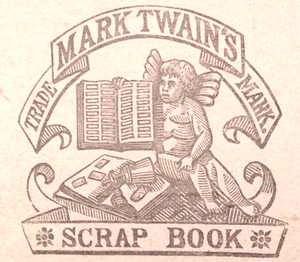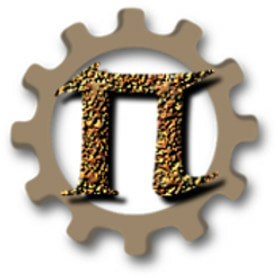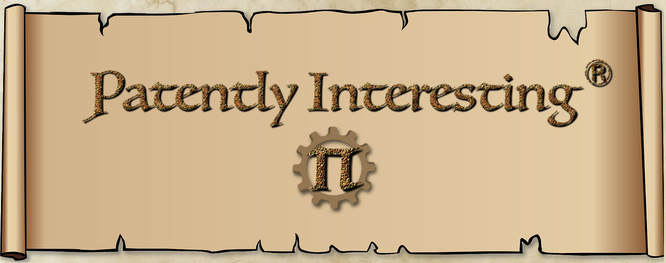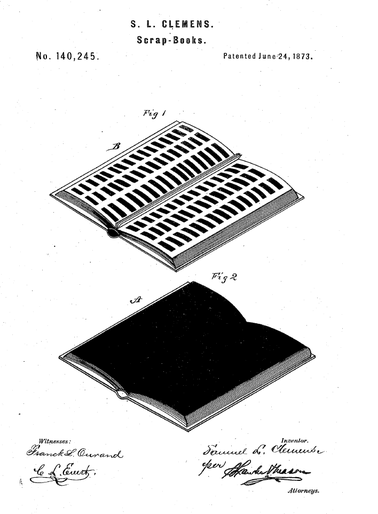 Samuel L. Clemens aka "Mark Twain"
Samuel L. Clemens aka "Mark Twain"
On June 24 of the year 1873, U.S. Patent No.: 140,245 issued to Samuel L. Clemens for an "Improvement in Scrap-Books". Clemens is better known by his pseudonym, "Mark Twain", which was a meausure of water depth used by steamboat pilots on the Mississippi River to indicate two fathoms. In addition to being a well-known writer, humorist, publisher, and lecturer, Twain was an inventor who held three patents. The '245 patent was his second and, by far, his most successful patent.
Twain liked to collect newspaper clippings, especially those about himself, and would store them in scrap-books. He was frustrated by the scrap-books and messy glue that were then in use, which often caused him to damage the newspaper clippings as he was mounting them. This frustration led to the invention of the '245 patent.
In the scrap-book of the '245 patent, the pages were pre-coated with a layer of mucilage or other adhesive, which would become sticky when moistened. Mucilage is an exopolysaccharide derived from plants and is edible by humans. Indeed, marshmallows were originally made from mucilage. The layer of mucilage applied to the pages of Twain's scrap-book could cover an entire page or be limited to discrete areas of a page. As described in the '245 patent, the benefit of the scrap-book was "the scrap-book is, so to say, self-pasting, as it is only necessary to moisten so much of the leaf as will contain the piece to be pasted in, and place such piece thereon, when it will stick to the leaf".
Due to Twain's experience with his first patent for an adjustabe garment strap, in which there was a dispute over who was the first inventor, Twain described his scrap-book invention in a letter that he sent to his brother, Orion. Twain instructed Orion to keep the letter and envelope because the postmark "ought to to be good evidence of the date of this great humanizing and civilizing invention." Fortunately, the envelope was not needed because there was no challenge to Twain's priority of invention for his scrap-book.
Twain liked to collect newspaper clippings, especially those about himself, and would store them in scrap-books. He was frustrated by the scrap-books and messy glue that were then in use, which often caused him to damage the newspaper clippings as he was mounting them. This frustration led to the invention of the '245 patent.
In the scrap-book of the '245 patent, the pages were pre-coated with a layer of mucilage or other adhesive, which would become sticky when moistened. Mucilage is an exopolysaccharide derived from plants and is edible by humans. Indeed, marshmallows were originally made from mucilage. The layer of mucilage applied to the pages of Twain's scrap-book could cover an entire page or be limited to discrete areas of a page. As described in the '245 patent, the benefit of the scrap-book was "the scrap-book is, so to say, self-pasting, as it is only necessary to moisten so much of the leaf as will contain the piece to be pasted in, and place such piece thereon, when it will stick to the leaf".
Due to Twain's experience with his first patent for an adjustabe garment strap, in which there was a dispute over who was the first inventor, Twain described his scrap-book invention in a letter that he sent to his brother, Orion. Twain instructed Orion to keep the letter and envelope because the postmark "ought to to be good evidence of the date of this great humanizing and civilizing invention." Fortunately, the envelope was not needed because there was no challenge to Twain's priority of invention for his scrap-book.
 Logo for Mark Twain Scrap-Book
Logo for Mark Twain Scrap-Book
Twain convinced his friend Dan Slote, who owned a stationay supply company called Slote, Woodman and Company to produce and distribute his patented scrap-book. The results were highly satisfactory. In the first year, over 25,000 copies of the Mark Twain Scrap-Book (as it became known) were sold. Sales ramped up from there and were reported to have exceeded more 100,000 copies per year for almost a decade. It is believed that Twain made more than $50,000 from sales of his scrap-book, which converts to well over a million dollars in today's money.
While Twain made good money from his scrap-book invention, he later lost almost his entire fortune investing in the invention of another person, James Paige, who had invented a typesetting machine, called the Paige Compositor. Twain invested over $300,000 (about $6 million in today's money) in the Paige Compositior, all of which was lost. This financial setback has been blamed for the decline in Twain's wit and humor.
While Twain made good money from his scrap-book invention, he later lost almost his entire fortune investing in the invention of another person, James Paige, who had invented a typesetting machine, called the Paige Compositor. Twain invested over $300,000 (about $6 million in today's money) in the Paige Compositior, all of which was lost. This financial setback has been blamed for the decline in Twain's wit and humor.



